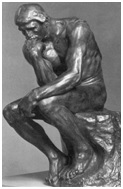|
 |
|
 |
|
|
||
Gottfried Leibniz - Philosophy, Learning and
Ethics
Gottfried Leibniz (1646-1716)
German philosopher (pictured right) and mathematician who invented:
What did he say about learning and ethics? 1. Rely on reasoning and the facts You find out the truth of something by:
a) checking it with the facts (as used in science) For example, to prove my friend is thin, you observe her to see if she is thin. b) reasoning i.e. seeing if something contradicts itself (as used in mathematics) For example, the two statements below are both false, because the second part of each statement contradicts the first:
These are now called analytic statements.
c) Leibniz’s “law of non-contradiction” This said that something is true, if it can’t be contradicted. (e.g. all bachelors are male, or 2+2=4). d) “compossibilities” These are possibilities that don’t contradict each other. (e.g. flowers are beautiful, and I like flowers).
2. The “principle of sufficient reason” For everything that is true, there must be a reason (i.e. fact or reasoning, see point 1) for its truth. This reason must be explained clearly, concisely, and comprehensively by appropriate speech, writing and
symbols. Leibniz’s symbols for calculus were much clearer than Isaac Newton's (pictured right) and are the ones used in mathematics today.
3. God is loving and perfect God created the “best of all possible worlds”, an idea savagely attacked by Voltaire (pictured right below), in his book, Candide. The world has evil, Leibniz believed, because God gives us a free will to choose between good and evil. A world without evil just isn’t possible.
4. The “principle of continuity” “Nature never makes leaps”, he said, In other words, everything:
5. Everything is different Every substance and person is different. If two things are identical, they are the same substance (the “Identity of Indiscernibles”).
6. Mind and body The mind is made of “nomads” that are:
So he disagreed with René Descartes' (pictured right) idea of the mind and body interacting.
7. Put theory into practice Theory must be used for some practical purpose. So he designed lots of useful things including a submarine and steam engine. 8. Learn from others Learning depends on:
a) people sharing their knowledge (particularly unwritten knowledge, which is more important than books). So he strongly supported the formation of national scientific societies like Britain’s Royal Society.
b) observation Learn from everything around you including the small and trivial. “Even in the games of children there are things to interest the greatest mathematician”, he said. c) openness to other cultures Leibniz learned greatly from Chinese mathematics, and their ethics, particularly from Confucius (pictured right).
Key quote on success Deeds make people.
Key quote on decision making There are two kinds of truths: truths of reasoning and truths of fact.
Key quote on God and religion If there were no best among all possible worlds, God would not have created one.
Key quote on creativity Nothing is more important than to see the sources of invention which are, in my opinion, more interesting than the inventions themselves. |
|
|
||
|
|
||
| Copyright © wisdomtowin.com 2025 All Rights Reserved | ||
|











